Student Senate Moves to Reuse
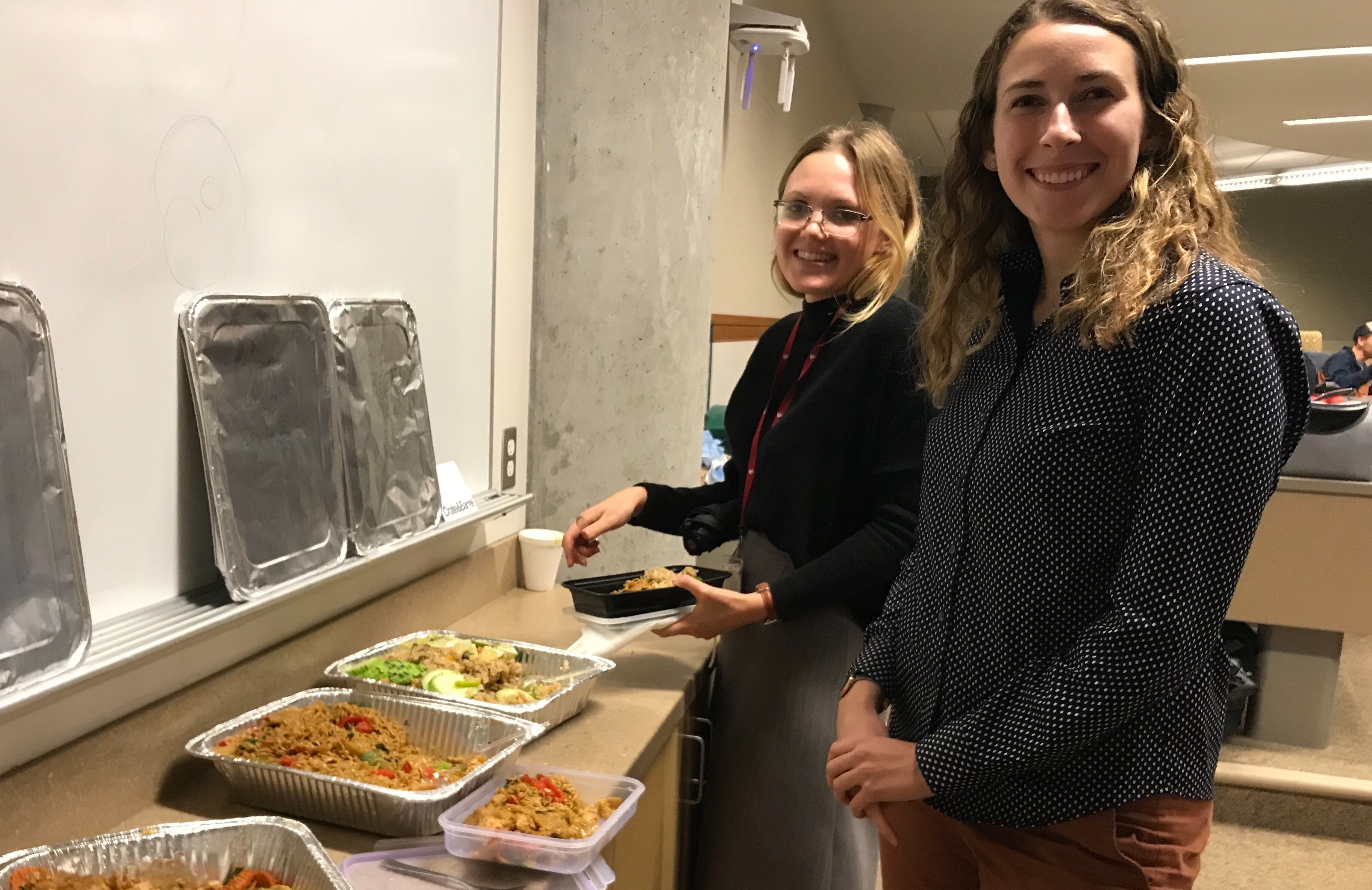
Photo, from left to right: Annie Cheney and Allison Vlach place their dinner in containers brought from home.
By Abbey Klein
“This year we are going to forego single-use items such as paper plates and plastic silverware! Please bring your own dishware and silverware for the meal tomorrow night!”
This was an email received by the UNMC Student Senators. Thomas Schroeder, a student in the College of Medicine and the current Senate Treasurer, brought the idea forward and it quickly gained popularity. “It seemed like an easy first step after seeing so many lunch meetings that had trash cans filled to the brim. If we want to reduce our waste as an institution, we need to take individual steps,” Schroeder added.
“I think it is imperative that we take a step towards waste reduction and sustainability,” said UNMC Student Senate President, Keith Ozanne. “We are hoping that we can act as a model for other student organizations to think about sustainability and affect change on this campus.”
This change is part of a larger goal of UNMC: to be net-zero waste, water, and building emissions by 2030. Additional 2030 goals include increasing active transportation and campus engagement, as well as an overall campus space planning goal. “The environment directly impacts our health,” stated Tina Spencer who works in the Office of Sustainability at UNMC and Nebraska Medicine. “Our sustainability goals are aggressive, but very necessary to affect and improve healthier outcomes. We’re fortunate to have a student body that’s passionate to enact change.”
While bringing your own dishware and utensils may seem like a big ask to busy students, many are pleased with the change. “It’s a small thing we can do to make a big impact on decreasing the waste generated on campus,” said Sarah Hotovy, UNMC Student Senator about the innovative, yet simple ways to reduce waste.
The UNMC Student Senate is comprised of students from each college. While the UNMC Student Senate works primarily on issues affecting fellow students, they also seek opportunities to improve their current processes. By ditching single-use items, such as plates and plastic silverware, and using materials that can be washed and re-used, they are reducing the amount of waste produced. Student Senators hope this small change will inspire others to find ways to reduce waste, both on campus and at home.
What can you reuse in your office, on your floor, or at home to reduce waste?
Think Before You Print
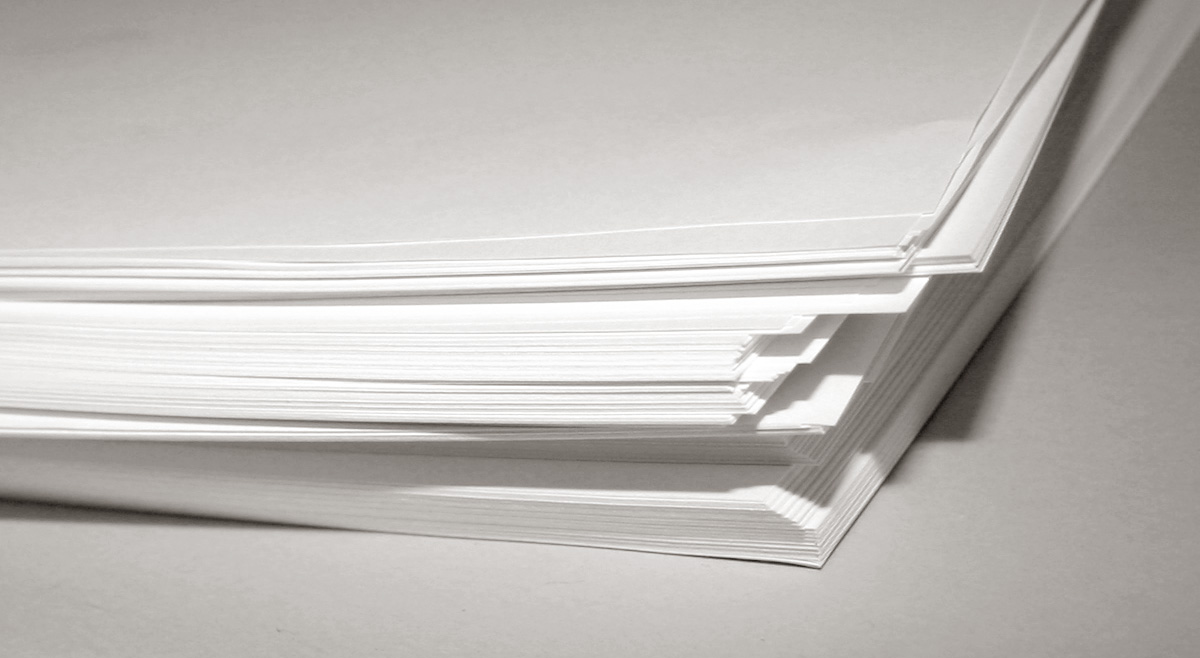
Paper usage has been an environmental hot topic for decades. It is easy to see the connection between paper usage and the environment, as we all grew up thinking about trees being cut down to be turned into paper. In 2018, UNMC & Nebraska Medicine used a combined total of 23.2 million sheets of paper (minimum) for the year. With new printer technology at Nebraska Medicine, we now have the data to say that 77% of those jobs were grayscale, which is great, but only 27% were double-sided.
Paper production is an environmentally harmful process, often using trees in endangered forests, relying only in part on recycled materials. Paper production is energy and chemical intensive, causing major pollution issues in waterways across the world, and endangering health. To make matters worse, the EPA estimated that 40% of paper and paperboard products ends up in the landfill.
The Paper Calculator is an interesting reference tool to determine the environmental effects of your personal paper usage.
This fall, we are launching a “Think Before You Print” campaign, that challenges all of us to use less paper. Below are some easy things you can do in your area:
- Use electronic meeting agendas and take notes electronically
- Don’t print notes, slides, or handouts for meetings/classes
- Use track changes in Word and comments/sticky notes in Adobe instead of making paper edits
- Use Teams and Sharepoint to work in documents
- Laminate common information sheets for patient review and only print necessary documents
- Email documents instead of faxing
- Place all paper in blue bins, which is required by policy, and ensures they are recycled
- Print double sided and in grayscale
- Eliminate blank pages and check settings before you print to avoid printing errors
We also challenge each of you to facilitate group dialogue and solutions in your area. The campus has well over six thousand printers. Are all needed? What are the largest uses of printed paper in your area? How could we reduce this number? Please tell LiveGreen@unmc.edu what changes you make so we can share your successes with others.
We will be monitoring the effects of this campaign using paper usage data. There are real environmental and financial benefits to using less paper, so Think Before You Print!
Energy Efficiency Day
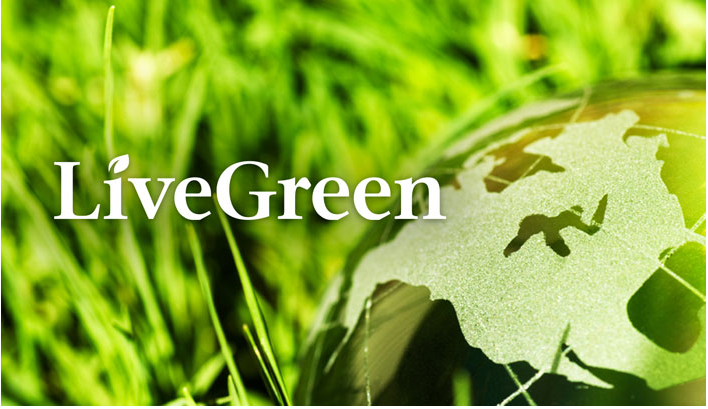
By Melanie Stewart
October 2nd is Energy Efficiency Day—a collaborative effort to “Save Money. Cut Carbon. Breathe Easier.” Yep, it’s all about energy use from energy groups, and the goal is still health.
As you hopefully know, this is why UNMC & Nebraska Medicine have a goal to achieve Net Zero Building Emissions by 2030—it directly aligns with our mission to create a healthy future for all. Emissions are driving climate change, which is already having an impact on our health, with more drastic changes coming. Emissions are pollution, and that pollution has now been tied to maladies in every bodily system—from cancer to diabetes to skin disorders and infertility.
As we work towards our goal, we’ve reduced a drastic amount of energy on campus—new systems and processes to control buildings, a new (highly efficient) chiller, LED lights in parking garages and buildings (update coming soon!), and changing processes for energy curtailment in the summer.
While those projects are impressive, it’s important not to forget those seemingly little actions that really add up! Every time you Flip the Switch (off), Shut the Sash on your fume hood, take the stairs instead of the elevator, or choose not to use an ADA button at a doorway, you are helping us to achieve our net zero energy goal. That energy may seem like a small, unnoticeable amount—but it’s not. The size of the Med Center means that thousands of lights are being turned off, hundreds of fume hoods are being closed, etc. and it really adds up!
The same is true at home—energy efficiency actions save you money, but the more people that take part the larger the effect is. Speaking of home, here are some simple actions you can take:
- Replace light bulbs with LEDs.
- Can’t replace them all at once? Start with the bulbs that are on the most.
- Seal leaks around doors and windows.
- Replace your furnace filter regularly.
- Turn off/unplug electronics that are not in use.
- Use cold water to wash clothes, air dry as many as possible.
- Close blinds in the summer, open them in the winter.
- Use a programmable thermostat, or set a reminder to change yours manually.
- Buy Energy Star labeled appliances and equipment.
Thank you for all you do to save energy, both here and at home; you are improving your health and the health of your community.
UNMC BBQ Repeats Zero-Waste Feat
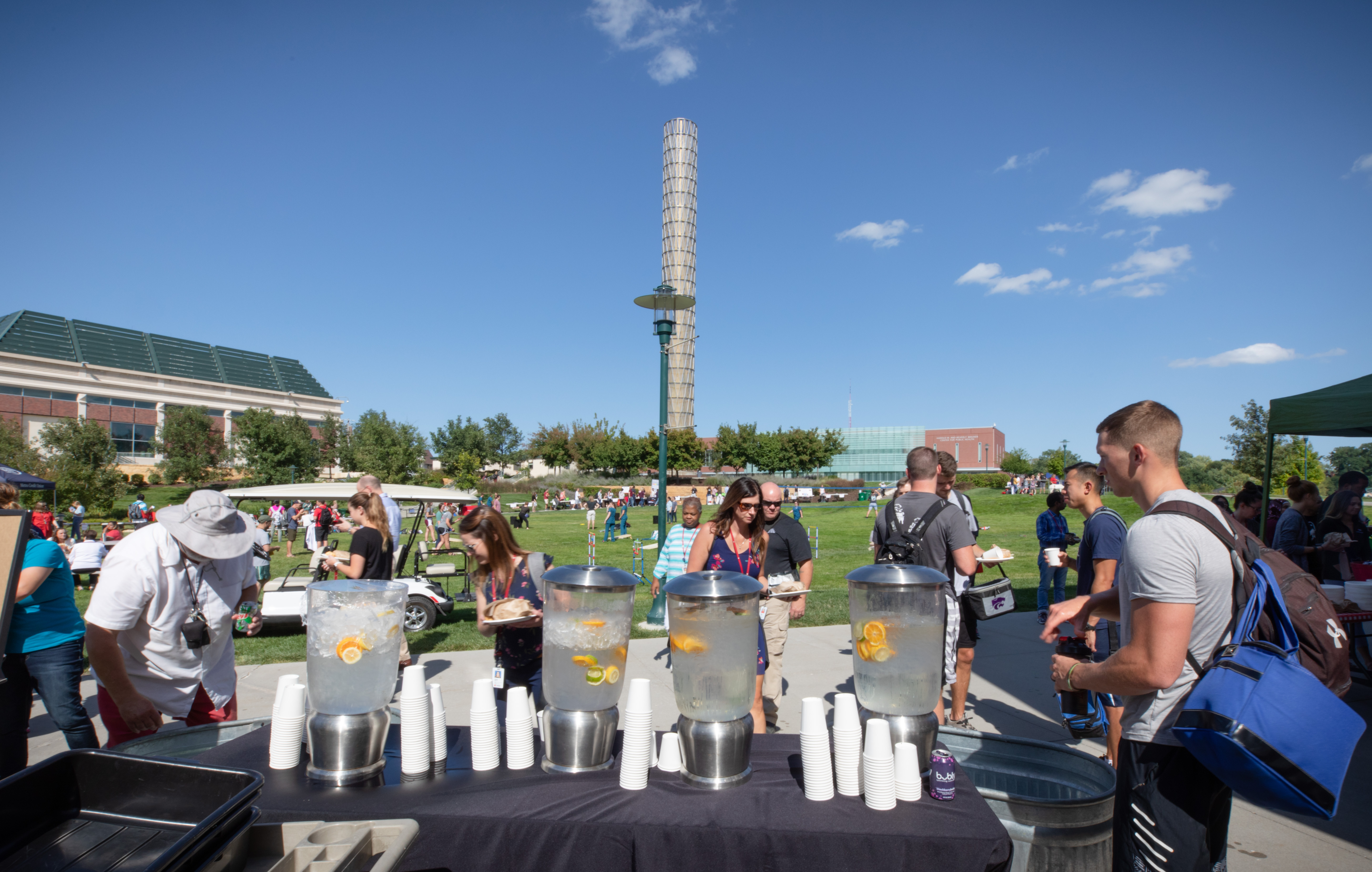
Have you ever thrown a party for more than 1,000 people but didn’t put any trash cans out? We did!
As you hopefully knew, the UNMC BBQ was held last month. It was a beautiful day, with hundreds of people showing up to play games, eat good (free!) food, and get information on campus opportunities.
Last year it was the campus’s first Zero Waste Event and we repeated this year.
A Zero Waste event means that at least 90% of all the waste generated in preparation for/at the event will be diverted from the landfill and incineration—by recycling and composting. The 10% allows for contamination or things that are unavoidable—this is often plastic wrap that protects unprepared food (uncooked meat), etc. that planners cannot control. We can control the types of food served and can work to keep that waste to a minimum. We can also control the items given to the end user to make sure they can be composted or recycled.
Sodexo/Catering found more compostable items for serving which made it easier for attendees to sort and there was nothing there that needed to go into a trash can—so we didn’t have any!
A special thanks to the volunteers who stood at the waste stations and made sure attendees got the right items in the right place. If you see Andrew Faltin, Cassandra Hays, Ana Lara-Ramirez, Chrystal Nathan, Tricia Saxton, Michael Skocz, Bobbi Shook, Susan Siebler, Victoria Smith, Julie Sommer, Hannah Stanzel, or Sami Vasistha, please thank them for helping people sort at the bins! Thanks to Tina Spencer and Kimberly Norman for helping clean up and weigh waste. Finally, don’t forget to thank the planning committee and Sodexo, as they were integral in setting this up.
So how did we do?
Meals Served=1,000+
Compost=166lbs
Mixed plastics & metal recycling=114lbs
Cardboard recycling=60lbs
Energy Bag/soft plastics=17.5lbs
Landfill=16.8lbs
Net Zero Waste Standard (soft plastics not recycled or composted): 91% diversion
Impressive! More than 1,000 meals and only 17lbs of trash! That comes out to 0.017lbs per person and has us easily diverting the 90% required. It’s also important to note that we served more meals and had the same amount of landfill (contaminated items from a not-well marked bin) but less overall waste, which is the correct thing to strive for.
Great Job!! Can you throw your own Zero Waste Event? Use our toolkit to help.
Campus Sustainability Month
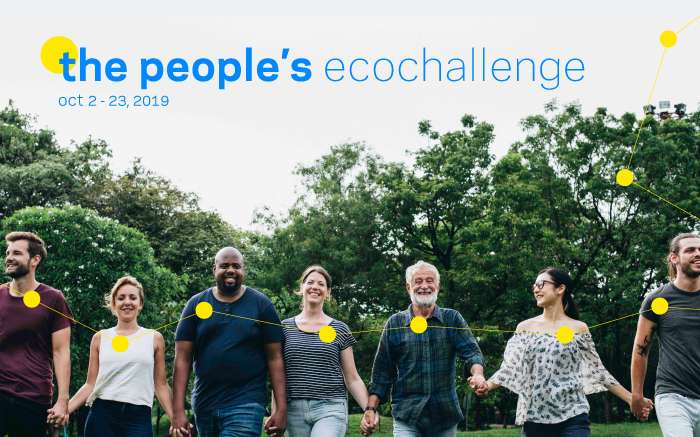
October is Campus Sustainability Month, and we will officially observe it for the first time with a variety of different events.
All month long you can take part in “The People’s Ecochallenge”. Like ecochallenges before, you can join our “UNMC/Nebraska Medicine LiveGreen” team and pick topics and actions that are interesting to you. Maybe you want to pledge to use only reusable shopping bags, commit to a heart healthy diet of at least 4 cups of fruits and vegetables a day, meditate, or even complete a home energy audit. The choice is entirely up to you, and you get to see your cumulative impact as well as a global one.
Come to the Fall Tree Festival on Thursday October 3rd from 11:30am-1:30pm in the green space between the Maurer Center for Public Health and the Student Life Center. We will be planting trees from a grant from ReTree Nebraska, and you can get tree information, learn why trees are integral to health, take part in fun activities, get freebies, sample some free food, learn about rain gardens, and ask a Master Gardener any questions you may have.
On Tuesday October 22nd Dr. Jesse Bell, the Claire M. Hubbard Professor of Health and Environment in the College of Public Health will share his presentation on Climate Change Impacts on Healthcare. Join us in Michael Sorrell Center room 2018; we’ll start promptly at noon and you can bring your own lunch.
On Tuesday October 29th join Julie Sommer, UNMC Research Resources Manager, in Eppley Science Hall Auditorium room 3010 will speak about her Voyage to Reduce Plastic Use. Julie is one of the few Americans selected as a crewmember of eXXpedition: Round the World 2019-2021. eXXpedition is a UK-based, all-female sailing voyage and scientific research mission with a focus on highlighting the devastating impact plastics from land-based activities are having on our planet’s oceans, ecosystems and on human health. Julie has begun a plastic-free journey in her home and daily life and will present some details of the mission of eXXpedition, but also open up a dialogue with attendees about ways to reduce plastics in our daily lives.
October has lots of important topics that have their own ‘days’, so we’ll cover those in a special article series.
Due to scheduling changes we will not be able to have the Sustainability Expo nor is UNO able to host a personal electronic and paper shredding event. We will have both next spring during our Earth Month celebration.
EVS Appreciation Week

It’s Environmental Services (EVS) Appreciation Week, a special time of the year to honor and acknowledge the amazing EVS staff at UNMC and Nebraska Medicine. In a complex healthcare environment, we heavily depend on them, though they are often unrecognized.
EVS performs a lot of often thankless tasks: cleaning toilets, continually cleaning up the salt we track in each winter, even wayfinding. All those things we take for granted—but definitely notice when they’re not done. They also take out the trash—all of it. Did you know that in the last year almost 8 million lbs of waste (equivalent to the weight of 24 blue whales, largest animal on earth) has left this campus? All of that has been handled by the person that cleans your area.
Recycling is an important part of our goals and EVS is happy to help, even though it creates extra steps for them. I hope you understand the health, economic, and pollution benefits of recycling; it’s so much more than meeting a goal and that makes this week the perfect time to thank EVS for the work they do.
Of that almost 8 million pounds of waste, we recycled 2.25 million lbs, equivalent to the weight of 885 mini cooper cars, hauled out of our spaces in 4 distinct streams (paper, plastic/metal, cardboard, trash). It’s get better—from 2010 to present we have recycled 11 million lbs; equivalent to the weight of 542 F-16 fighter jets.
At any opportunity, whether this week or next month, please take time to acknowledge and thank an EVS employee for their extraordinary contribution to our many successes. You can also ensure items are getting recycled while helping them to do their job by:
- Pouring out all liquids before recycling (scrape food off too)
- Blue bins are only for paper—not cardboard or bottles
- If you don’t have a trash can in your office, trash and recyclables must be taken elsewhere. That decision was budgetary and was not made by your EVS person—don’t take it out on them
- Fiber clamshells are currently trash (not paper or cardboard) but will be composted soon
- Flatten all cardboard, place it between the wall and the bin
- Don’t wish-cycle; it’s important to recycle right
- Say thank you!—everyone wants to know their contribution is valued
Speaking of, thank you—taking these easy steps to recycle everything you can is important.
image courtesy of: freeimages.com/dominikgwarek
New School Year, New Transportation
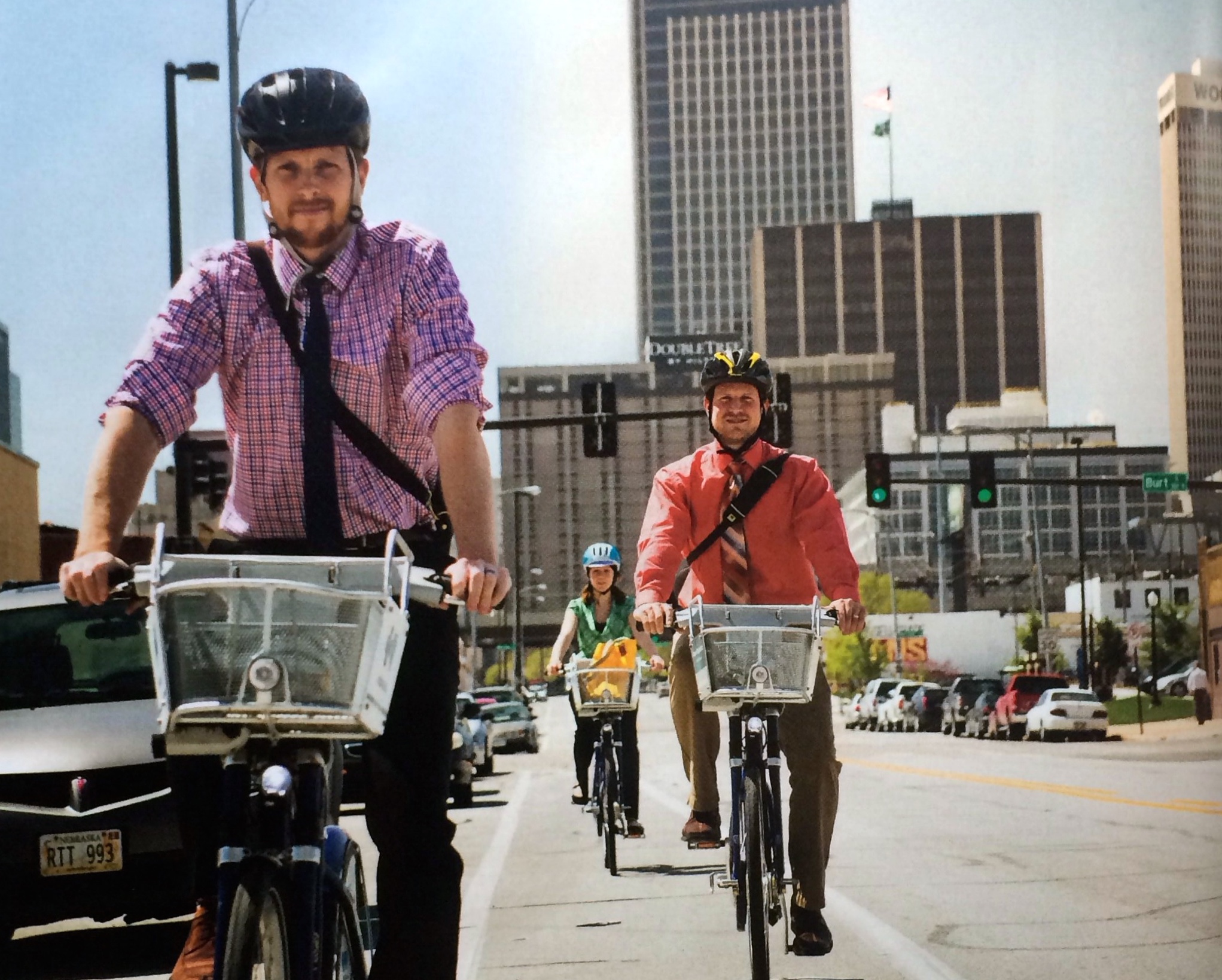
Schools are back in session and it’s likely changed or slowed down your commute. It’s a great time to switch a trip, saving you time and money. Here’s the details you need to know:
Cost
It’s FREE! No gimmick; everything, including the free bus pass will always be free. Your badge is used only to identify you as a rider and is not tied to your Metro Credit Union account.
If you choose to carpool and all members of the carpool turn in their parking permits, you will receive a FREE carpool pass to the best parking lot among you (your choice); and nobody pays for parking.
TravelSmart is a perk and can save you money while reducing pollution and promoting a healthy lifestyle while reducing parking pressure and traffic congestion.
Parking Permit
Not quite ready to relinquish your parking permit? You can keep it and still use any of the active transportation options with access to all the support programs. You can use active transportation as frequently as works for you. Our Savings Calculator will tell you how much money you can save and whether it’s financially advantageous for you to keep your permit or turn it in—but either way it’s your choice.
Daily Rate Flexible Parking is available if you need to drive to campus and don’t have a permit. Only pay for parking when you need it, lots are located around campus, and you can pay via smartphone or website.
The 3 month trial starts when you turn your permit in. You save money while you test out TravelSmart, and get your same permit back if you still want it.
Carpool
If you want to carpool but don’t know who to drive with, check our carpool matching page. Signup on MetroRideShare is free and if you use your med center email only people from this campus can see the rides that have been posted. You don’t have to ride with the person it matches you with, so there’s no harm in posting a ride to see if it will work out, even if you work odd hours or a different shift. You’ll save lots of money on gas and car maintenance.
Registering for TravelSmart
Click on the appropriate button on our registration page to go to the correct self-service page. Please note that Nebraska Medicine and Clarkson College employees need to check the “Olympus” box prior to logging in. If you are unfamiliar with that page check out the instructions with screen shots on our registration page to help guide you.
Questions?
If you have more questions visit our FAQ page or Video/Resources page. Or email TravelSmart@unmc.edu or call 559-8580 (ext. 3); we are happy to help!
Fall Party Prep
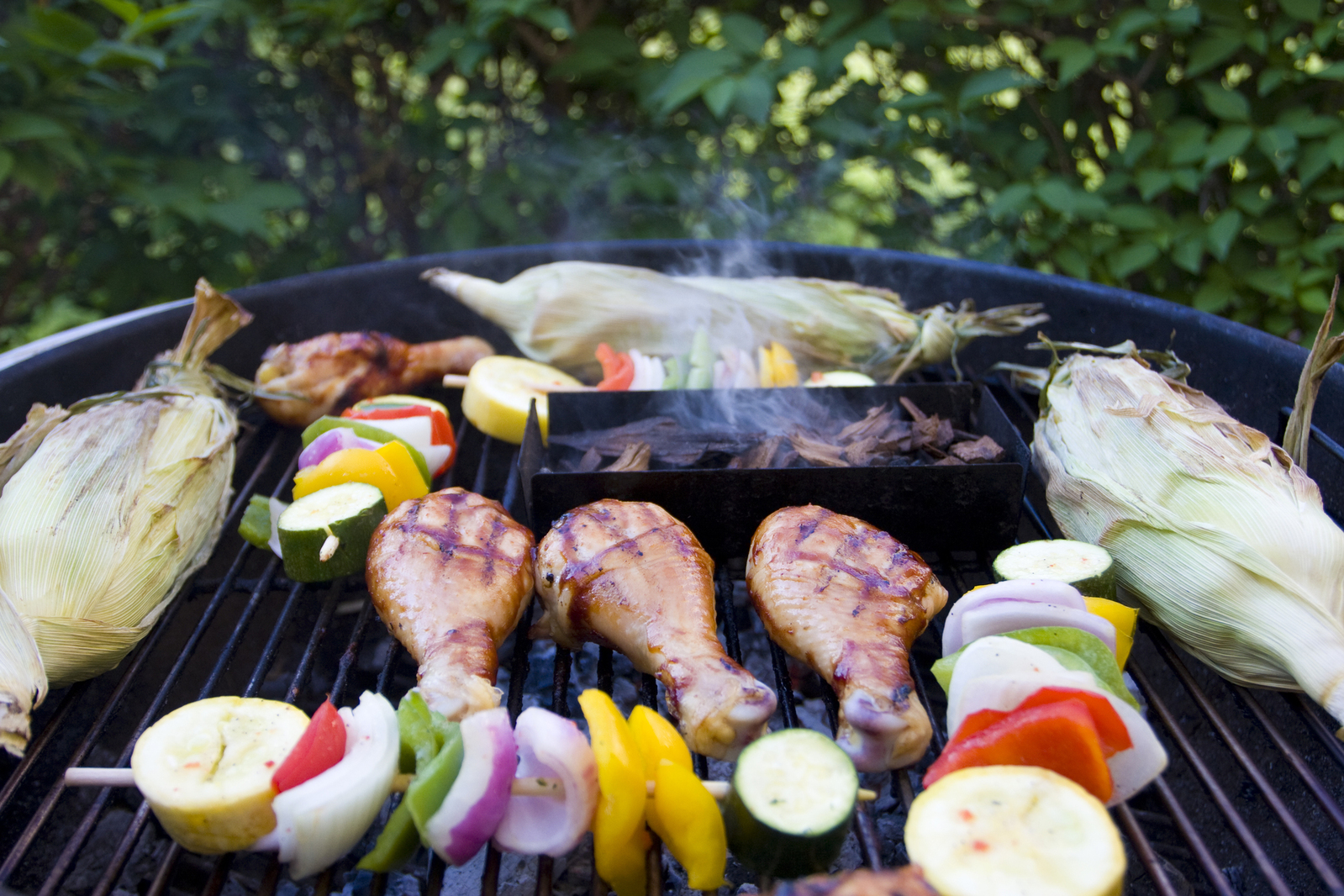
By Melanie Stewart
Excited for fall? Cooler temps, leaf crunching, and get-togethers! Maybe it’s a football watching party, baseball playoffs, or your neighborhood cornhole championship. If you aren’t a sports fan, I’m willing to bet you have a Labor Day party, family picnic, or a Halloween/fall party to host or attend.
All of those parties means lots of people, food, and waste.
So what can you do to reduce that impact and save you money? LiveGreen has easy tips for you in this 2-part article, no lifestyle change required.
As always, preparation is key.
Food is a party staple and is resource-intensive, so follow these tips to save.
Use reusable tableware, utensils, and serving dishes. Yes, they are a little more expensive, but they’ll pay for themselves after a few parties. Don’t forget your friends! They’ll likely let you borrow serving dishes or other necessities. Most will be dishwasher safe, making cleanup easy. If reusable tableware isn’t an option, buy recyclable items made with recycled material. Strive for plastics labeled #1 & #2, as they are more easily recycled.
If you are using materials that are recyclable, make sure they get recycled! Have easily accessible bins, label them to make it easy for guests, and always have trash and recycle bins next to each other. Consider using “Energy Bags” for soft plastics. If you are in a park or at a tailgate, take those recyclables home, and whatever you do, don’t litter.
To decorate, use things you already have—memorabilia, blankets, even old apparel. Go back to those friends and borrow this from them too. You can do the same for their next party and everybody wins. If you must buy new, look for things that will last a long time so you don’t have to purchase them again and look for items made of recyclable material. Have old apparel you don’t wear but can’t give up? Use them to make reusable napkins, tablecloths, or other decorations.
Whenever possible, buy in bulk. Larger quantities of the items you know you will need will ultimately save you money and reduce the amount of waste created. One family size bag of chips is less packaging than 2 small ones and a case of pop is less packaging than two 12-packs. Items like this store all season long and save you trips to the store. Remember to take reusable bags whenever you shop.
Solar Panel Open House

Join LiveGreen and Facilities, Management and Planning for an open house at the Maurer Center for Public Health solar panels. On Wednesday, September 11th, come to conference room 3020 anytime between 11:30am-1pm, stay however long you want, ask questions (we can talk about solar at your home, too!), get facts, and of course see the solar panels (short flight of stairs required). We’ll provide light refreshments.
The 1,487 solar panels sit atop the three largest roof surfaces on campus — the Michael F. Sorrell Center for Health Science Education, the Stanley M. Truhlsen Eye Institute, and the Harold M. and Beverly Maurer Center for Public Health.
The panels can generate up to 500 kilowatts of solar-powered electricity to help power the campus; and “its’ energy production will equal the average annual electricity use of 60 homes in OPPD’s service territory.” said Jared Friesen of Morrissey Engineering, which designed the project. The solar arrays are using a combination of east and west-facing panels, built to maximize the energy produced in each square foot of roof space used, while reducing shade between rows, and limiting the overall weight added to the roof, Friesen said.
Darren Dageforde, executive director of utilities and energy utilization for UNMC, said the med center has already made great strides in reducing energy use and increasing efficiency.
“Having a renewable energy source on campus demonstrates our commitment to being carbon neutral by 2030 and parallels our mission to create a healthy future for all individuals and communities.”
For maximum efficiency, the three buildings with the solar panels will use the electricity generated first. Any additional electricity can be used by other campus buildings but will not be stored. This consistently reduces the overall electric demand on campus.
The project is part of an Interlocal Agreement between the OPPD Board of Directors and the UNMC Board of Regents. It is the latest in a number of energy-efficiency efforts added to the campus since 2012.
Interested in solar at your home? The cost to install solar panels continues to decline, OPPD has outlined a process, Google’s Project Sunroof can help map your home’s solar exposure, and Nebraskans for Solar has great resources on all facets of solar.
Fresh Garden Produce!
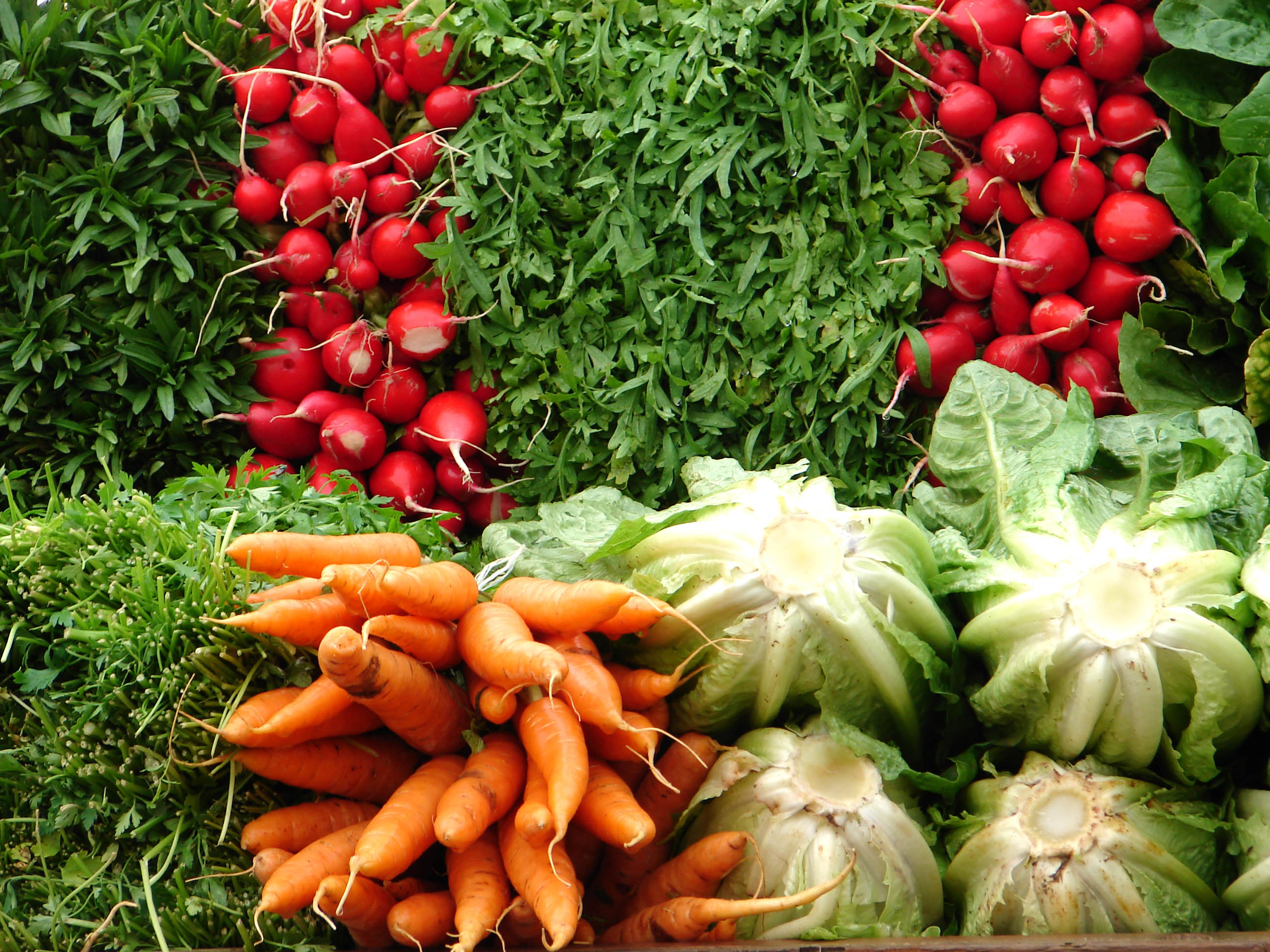
Last week Victoria’s home composting article outlined the success she had while making her aware of the amount of food being wasted.
It’s estimated that 40% of food in the U.S. is never eaten, and each U.S. household wastes at least $1500 in food each year; and it doesn’t count the waste of the resources used to produce that food or get it to your home. Check out this article for a variety of easy steps you can take to save food, money, and resources.
If you have planted a garden, participate in a CSA, or go to a farmers market, you (hopefully) have a lot of produce. If you are like some of us, you end up with a lot of the same kind of vegetable or a lot of vegetables at once; which could be more than you can eat.
Not sure what to do with your extra zucchinis?
Don’t know how to preserve fruits to use later this winter?
What about all those tomatoes?
LiveGreen can help you reduce food waste and save you money!
Visit our Recipe board on Pinterest for lots of new-to-you recipes that include fresh fruits, vegetables, and herbs. There’s also meatless recipes, organic recipes, and light and fresh recipes that are perfect for those hot summer days!
You can also go to our Food board on Pinterest to find numerous resources on how different vegetables and fruits can be preserved for long periods of time including canning and freezing.
Not a good harvest? Our Garden board can help with common ailments or check out the Douglas/Sarpy County Extension; their master gardeners can help with lots of problems and questions, and their website has lots of topics…It’s not too late!
You may also be interested in Edible Omaha, (currently on hiatus) a free publication that highlights clean eating, sustainable food sources and local and organic food. They have a digital version of their publication and numerous recipes posted online.
If you have planted non-hybrid (heirloom) plants you may be interested in seed saving. Saving seeds helps to preserve some of the genetic diversity of plants to increase qualities such as drought-tolerance, heat-and-cold-tolerance, and disease resistance. For information on how to do so, check out this seed saving handbook.
Planted only hybrids this year? Consider checking seeds out from the Benson Library or Seed Savers Exchange next year to start your crop.
